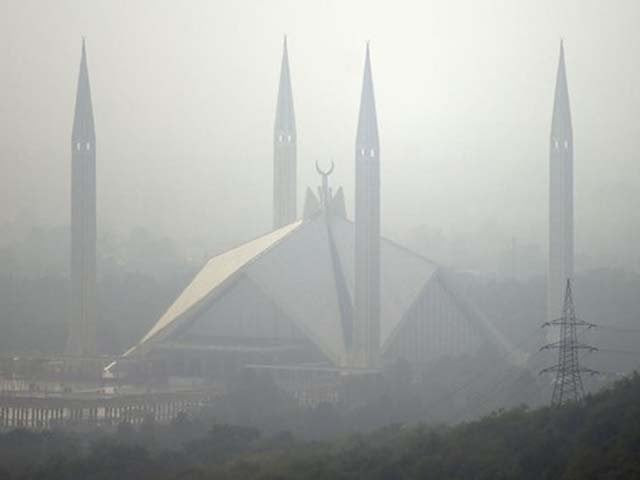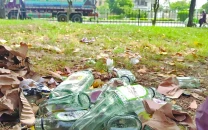Smog control measures fall short
AQI in Rawalpindi and Islamabad reaches 246 and 230 respectively, endangering citizens' health

Smog continued spreading in the twin cities of Rawalpindi and Islamabad and the air pollution index increased alarmingly on Sunday, exposing the so-called anti-smog measures taken by the district government.
The contribution of smog-emitting vehicles was the highest, at 83.15%, followed by factories, brick kilns, and bakeries at 9.07%, agricultural residue burning at 3.9%, garbage burning at 3.6%, and commercial at 0.14%, while household stoves accounted for 0.11%.
After central and south Punjab, the air quality index (AQI) in Rawalpindi and Islamabad also entered the dangerous zone to reach 246 and 230 respectively.
Due to an increase in air pollution, temperature, dry cough, fever, eye irritation and related diseases also engulfed the residents of the twin cities.
The district administration miserably failed to take action against smoke-emitting vehicles as smoke from tractor trolleys, trucks, large vehicles, passenger buses, passenger and freight trains and motorcycles continued engulfing the entire cities.
Due to this smoke and exhaust gases, dust also settled on the leaves of the trees, while clean cars parked at night were also found covered with dirt in the morning.
The Regional Transport Authority (RTA) impounded 41 smoke-emitting vehicles and fined Rs250,000 to 27 others in a week.
The agriculture department spokesman, Haroon Ahmed said that 13 people, who disposed of crop residue by setting fire, were fined Rs200,000 and all 15 stone crushing machines of Taxila Margalla Hills had been permanently shut. All the kilns in the twin cities will be shut down for one and a half months from December to January 31.
The environmental protection department and the district administration predict the possibility of rain next week.
Earlier this month, the twin cities declared a smog emergency and anti-smog operations were launched. Further, the district administrations and the departments of higher education, health and environmental protection issued a new 12-point anti-smog advisory guideline for citizens, including civil servants and students.
Under the new guideline, citizens have been advised to wear masks and wash their hands, mouths and eyes using clear water, wear glasses during outdoor movements, use full-sleeved shirts, avoid rubbing eyes during swelling or pain and stay away from lighting a fire to dispose of garbage in houses, streets, neighbourhoods, markets, roofs of houses, offices, colleges and schools.
The residents of both cities have been further advised against spraying in standing water in the open and in residential properties and urged to drink 10 to 12 glasses of water daily, coffee, tea and cold soup.
The guideline further advises motorcyclists to wear masks during bike riding and households and staff of houses and offices to keep windows and doors closed. The instructions have been issued to immediately sweep the soil/sand around the clothes and the body.



















COMMENTS
Comments are moderated and generally will be posted if they are on-topic and not abusive.
For more information, please see our Comments FAQ